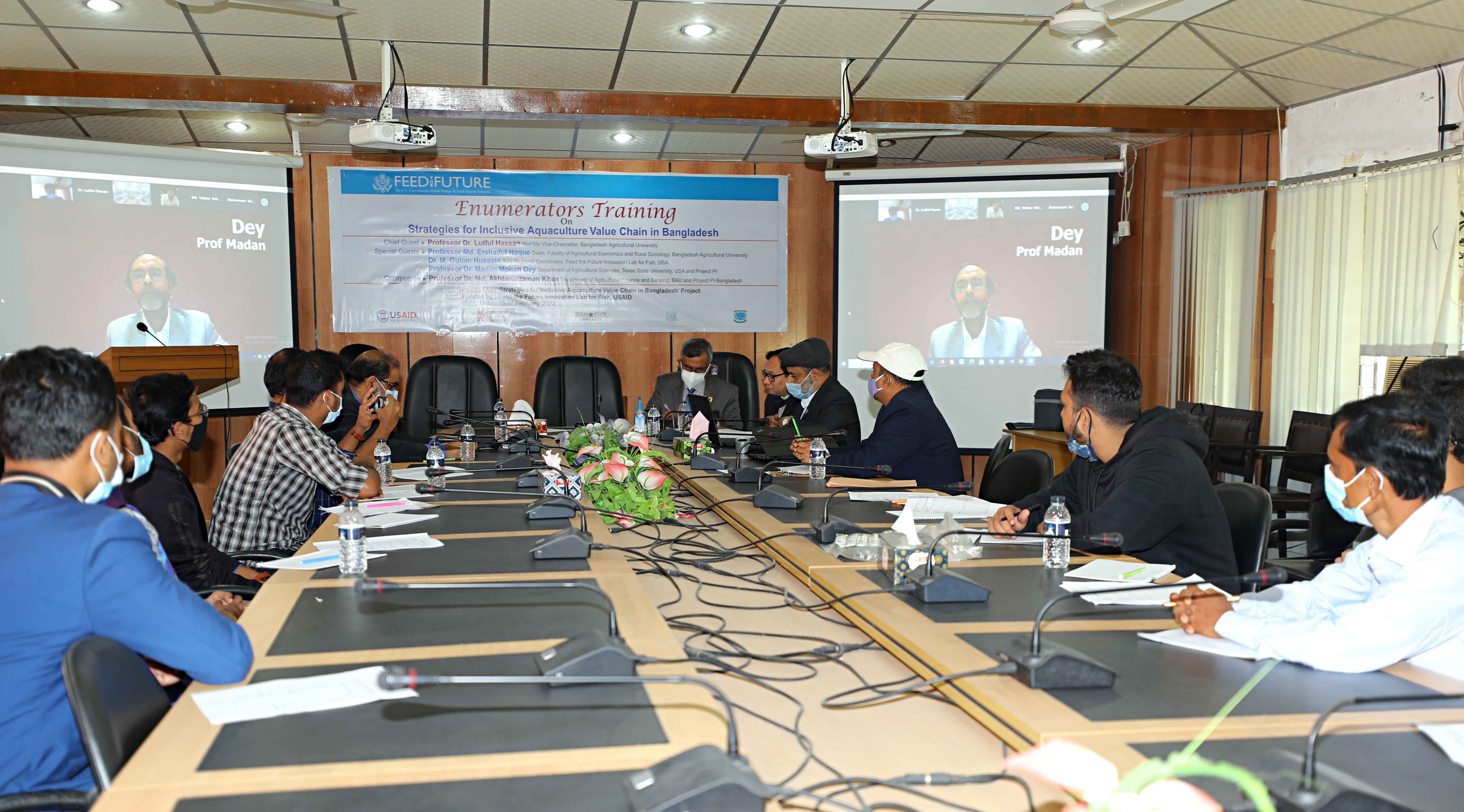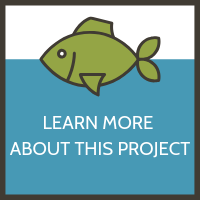
By Md. Akhtaruzzaman Khan and Md. Emran Hossain
The Feed the Future Innovation Lab for Fish has launched a pertinent project in Bangladesh to improve the aquaculture value chain and stakeholders' market access, trade, and consumption patterns. This project will conduct a survey of 800 fish farmers from nine districts of Bangladesh (including the Feed the Future zone of influence) to assess the status of production and use of inputs, COVID-19 effects, trade credit situation, and resilience capacity of the fish farmers. Well-trained data enumerators are required to gather high-quality primary data and meet the project's objectives. The project team arranged a two-day (February 16-17, 2022) training program at Bangladesh Agricultural University (BAU). The program was inaugurated by Vice-Chancellor of BAU, Lutful Hassan, who also was the chief guest of the program.
“This is a time-demanding and stakeholder-driven project to improve fish farmers’ market access,” Hassan said. “Fish farmers strive to optimize their output by performing intensive operations such as feeding and caring for their fish, but they do not receive a fair price; therefore, their profit is skewed. I am hopeful that this initiative will increase aquaculture producers’ market access and promote market accessibility for reasonable fish pricing.”
Md. Akhtaruzzaman Khan, the project’s Bangladesh principal investigator, presided over the training program and provided an overview of the project's operations. Madan Mohan Dey, the project’s U.S. principal investigator and special guest of the program, briefly discussed the project's objectives and how that will be achieved, giving thanks to the Fish Innovation Lab for funding the project to improve the aquaculture sector of Bangladesh.
In this program, M. Gulam Hussain, the Fish Innovation Lab’s Asia regional coordinator, was also a special guest. Md. Ershadul Haque, dean of BAU’s Faculty of Agricultural Economics and Rural Sociology, was also presented as a special guest of this program.
Nine data enumerators participated in the training program in person. Dey and the faculty members joined through online video conferencing.
After the inaugural session, the enumerators’ training was handled by Md. Emran Hossain, the research associate of the project, along with Md. Akhtaruzzaman Khan. Following the initial briefing about the interview schedule, participants received training about the open-source data collection platform KoBo Toolbox, which will be used as a survey tool for this project. The enumerators are postgraduate students in different disciplines of BAU and have previous experience in real-time online data collection through mobile devices or tablets. The interview schedule has five specific parts such as basic information of farmers, production and return, trade credit, the impact of COVID-19, and resilience capacity of aquaculture producers. The in-person training approach was used to facilitate capacity building while ensuring the safety of participants. The training program focused on building the capacity of enumerators by familiarizing them with the digital tools to collect and compile data from remote regions with limited internet accessibility.
The KoBo Collect mobile app and direct link, opened through Google Chrome browser, will be used to save survey data offline on mobile devices for later upload at internet connection points and is the tool of choice for farm surveys. Real-time data collection requires a proper grasp of general server settings, loading updated survey forms, and saving the data. Delivery of these issues was emphasized during the training. Enumerators were also acquainted with the mobile app and survey tool throughout the training program by filling out a mock interview schedule. Prospective enumerators were required to outline what they learned, how they will approach farmers, and ask some specific questions after each training session to go with the next round of training. This was done for assessment purposes and to keep participants involved. In the final session of the training, every enumerator was asked to talk with at least two farmers in the field as a pre-test of the interview schedule and develop their skills.
“Using a mock survey submission on the KoBo Collect mobile application and Chrome browser helped prepare me for the actual survey, and it was easy to use,” said Md. Mahmudul Hasan Murad, an enumerator of the project. “Having gone through the KoBo Collect training, mock surveys, and the 2-day training event, I can confidently use these tools for future data collection of this project and other research projects. It was a true honor and privilege.”
Another enumerator, Md. Salauddin, said, “My long-term goal is to use what I learned in the training to collect the primary data for this project as well as my master’s thesis. This data collection tool is extremely user-friendly. I am certain that I can now collect the data using this software and complete this task efficiently in a farmer's field. Familiarity with the training platform will pave the road for the project's goals to be met.”
Published March 16, 2022

